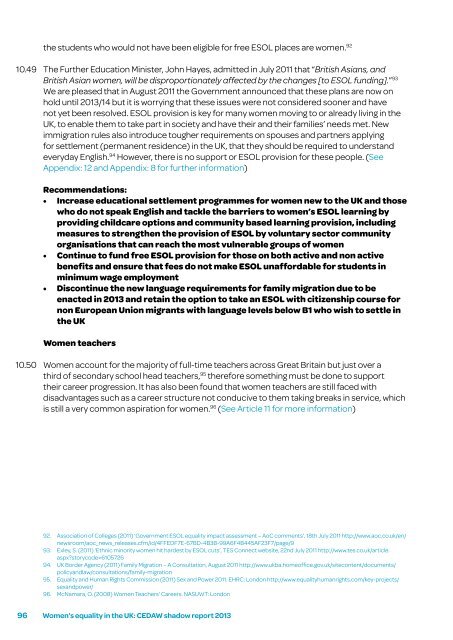Women’s equality in the UK – A health check
Women’s equality in the UK – A health check
Women’s equality in the UK – A health check
You also want an ePaper? Increase the reach of your titles
YUMPU automatically turns print PDFs into web optimized ePapers that Google loves.
10.49<br />
10.50<br />
<strong>the</strong> students who would not have been eligible for free ESOL places are women. 92<br />
The Fur<strong>the</strong>r Education M<strong>in</strong>ister, John Hayes, admitted <strong>in</strong> July 2011 that “British Asians, and<br />
British Asian women, will be disproportionately affected by <strong>the</strong> changes [to ESOL fund<strong>in</strong>g].” 93<br />
We are pleased that <strong>in</strong> August 2011 <strong>the</strong> Government announced that <strong>the</strong>se plans are now on<br />
hold until 2013/14 but it is worry<strong>in</strong>g that <strong>the</strong>se issues were not considered sooner and have<br />
not yet been resolved. ESOL provision is key for many women mov<strong>in</strong>g to or already liv<strong>in</strong>g <strong>in</strong> <strong>the</strong><br />
<strong>UK</strong>, to enable <strong>the</strong>m to take part <strong>in</strong> society and have <strong>the</strong>ir and <strong>the</strong>ir families’ needs met. New<br />
immigration rules also <strong>in</strong>troduce tougher requirements on spouses and partners apply<strong>in</strong>g<br />
for settlement (permanent residence) <strong>in</strong> <strong>the</strong> <strong>UK</strong>, that <strong>the</strong>y should be required to understand<br />
everyday English. 94 However, <strong>the</strong>re is no support or ESOL provision for <strong>the</strong>se people. (See<br />
Appendix: 12 and Appendix: 8 for fur<strong>the</strong>r <strong>in</strong>formation)<br />
Recommendations:<br />
• Increase educational settlement programmes for women new to <strong>the</strong> <strong>UK</strong> and those<br />
who do not speak English and tackle <strong>the</strong> barriers to women’s ESOL learn<strong>in</strong>g by<br />
provid<strong>in</strong>g childcare options and community based learn<strong>in</strong>g provision, <strong>in</strong>clud<strong>in</strong>g<br />
measures to streng<strong>the</strong>n <strong>the</strong> provision of ESOL by voluntary sector community<br />
organisations that can reach <strong>the</strong> most vulnerable groups of women<br />
• Cont<strong>in</strong>ue to fund free ESOL provision for those on both active and non active<br />
benefits and ensure that fees do not make ESOL unaffordable for students <strong>in</strong><br />
m<strong>in</strong>imum wage employment<br />
• Discont<strong>in</strong>ue <strong>the</strong> new language requirements for family migration due to be<br />
enacted <strong>in</strong> 2013 and reta<strong>in</strong> <strong>the</strong> option to take an ESOL with citizenship course for<br />
non European Union migrants with language levels below B1 who wish to settle <strong>in</strong><br />
<strong>the</strong> <strong>UK</strong><br />
Women teachers<br />
Women account for <strong>the</strong> majority of full-time teachers across Great Brita<strong>in</strong> but just over a<br />
third of secondary school head teachers, 95 <strong>the</strong>refore someth<strong>in</strong>g must be done to support<br />
<strong>the</strong>ir career progression. It has also been found that women teachers are still faced with<br />
disadvantages such as a career structure not conducive to <strong>the</strong>m tak<strong>in</strong>g breaks <strong>in</strong> service, which<br />
is still a very common aspiration for women. 96 (See Article 11 for more <strong>in</strong>formation)<br />
92. Association of Colleges (2011) ‘Government ESOL <strong>equality</strong> impact assessment <strong>–</strong> AoC comments’, 18th July 2011 http://www.aoc.co.uk/en/<br />
newsroom/aoc_news_releases.cfm/id/4FFEDF7E-67BD-4B3B-99A6F4B445AF23F7/page/9<br />
93. Exley, S. (2011) ‘Ethnic m<strong>in</strong>ority women hit hardest by ESOL cuts’, TES Connect website, 22nd July 2011 http://www.tes.co.uk/article.<br />
aspx?storycode=6105726<br />
94. <strong>UK</strong> Border Agency (2011) Family Migration <strong>–</strong> A Consultation, August 2011 http://www.ukba.homeoffice.gov.uk/sitecontent/documents/<br />
policyandlaw/consultations/family-migration<br />
95. Equality and Human Rights Commission (2011) Sex and Power 2011. EHRC: London http://www.<strong>equality</strong>humanrights.com/key-projects/<br />
sexandpower/<br />
96. McNamara, O. (2008) Women Teachers’ Careers. NASUWT: London<br />
96 <strong>Women’s</strong> <strong>equality</strong> <strong>in</strong> <strong>the</strong> <strong>UK</strong>: CEDAW shadow report 2013


